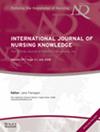Clinical validation of the nursing diagnosis of impaired mood regulation among individuals with experience of mood disorders
Abstract
Purpose
The aim of the study was to validate the defining characteristics (DCs) of the nursing diagnosis impaired mood regulation using related criteria in an African context.
Methods
This descriptive study was conducted in two tertiary mental healthcare institutions in Nigeria. Richard Fehring's clinical diagnostic validity model was employed to collect data from 87 individuals experiencing mood problems. Their scores were validated with other criteria, and the influence of socio-demographic and clinical variables on participants’ identification of the DCs was determined using analysis of covariance (ANCOVA). The significance level was 0.05.
Findings
Five of the 27 DCs validated were rated major, 5 considered not characteristics, and the rest were minor characteristics of the diagnosis. A two-way subject ANCOVA was significant for diagnosis alone, F (2, 87) = 7.41, p = 0.006 (after eliminating the effect of age and gender of the participants), and when combined with duration of illness, F (38, 87) = 2.38, p = 0.036. A positive but weak correlation was found between the DC scale and mood disorder questionnaire, rs (85) = 0.353, n = 87, p = 001 with R2 = 0.102, but a positive and strong correlation with patient health questionnaire, rs (85) = 0.733, n = 87, p = 000 with R2 = 0.565.
Conclusions
The DCs listed in NANDA-I nursing diagnoses manual were valid for the nursing diagnosis. However, there are additional characteristics that would further enhance the applicability of the diagnosis.
Implications for nursing practice
The result of this study will contribute immensely to the identification of individuals experiencing problems with mood regulation that would otherwise have been missed, thus facilitating early intervention and good outcome. Furthermore, additional characteristics validated in this study offered opportunity for further research on the diagnosis.

 求助内容:
求助内容: 应助结果提醒方式:
应助结果提醒方式:


